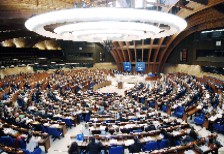MONEYVAL - The Committee of Experts on the Evaluation of Anti-Money Laundering Measures and the Financing of Terrorism was established in 1997. MONEYVAL assesses its members' compliance with all relevant international standards in the legal, financial and law enforcement sectors through a peer review process of mutual evaluations.
The aim of MONEYVAL is to ensure that its member states have in place effective systems to counter money laundering and terrorist financing and comply with the relevant international standards in these fields.
Such standards are those contained in the recommendations of the FATF, including the Special Recommendations on Terrorist Financing, the 1988 United Nations Convention against Illicit Traffic in Narcotic Drugs and Psychotropic Substances, the United Nations Convention against Transnational Organized Crime, the 1999 United Nations International Convention for the Suppression of the Financing of Terrorism, the Directive 2005/60/EC of the European Parliament and of the Council of 26 October 2005 on the prevention of the use of the financial system for the purpose of money laundering and terrorist financing and the relevant implementing measures and the 1990 Convention on Laundering, Search, Seizure and Confiscation of the Proceeds from Crime, concluded within the Council of Europe.
Moneyval reports provide highly detailed recommendations on ways to improve the effectiveness of domestic regimes to combat money laundering and terrorist financing and states’ capacities to co-operate internationally in these areas. The first evaluation report for Serbia was published in 2005 and the last progress report in this area was published in December 2012.
MONEYVAL also conducts typologies studies of money laundering and terrorist financing methods, trends and techniques.
In November 2009, the Securities Commission adopted the Guidelines for Application of the Law on Prevention of Money Laundering and Terrorism Financing for Obligors within the Remit of the Securities Commission (broker-dealer companies, authorized banks, custody banks, and investment fund management companies) in accordance with the recommendations and international standards applying the risk-based approach.
Moreover, the Securities Commission cooperates with international organizations and regulatory authorities considering the application of regulations for prevention of money laundering and terrorism financing, participating in exchange of information and by responding to official requests for information and assistance.
The aim of MONEYVAL is to ensure that its member states have in place effective systems to counter money laundering and terrorist financing and comply with the relevant international standards in these fields.
Such standards are those contained in the recommendations of the FATF, including the Special Recommendations on Terrorist Financing, the 1988 United Nations Convention against Illicit Traffic in Narcotic Drugs and Psychotropic Substances, the United Nations Convention against Transnational Organized Crime, the 1999 United Nations International Convention for the Suppression of the Financing of Terrorism, the Directive 2005/60/EC of the European Parliament and of the Council of 26 October 2005 on the prevention of the use of the financial system for the purpose of money laundering and terrorist financing and the relevant implementing measures and the 1990 Convention on Laundering, Search, Seizure and Confiscation of the Proceeds from Crime, concluded within the Council of Europe.
Moneyval reports provide highly detailed recommendations on ways to improve the effectiveness of domestic regimes to combat money laundering and terrorist financing and states’ capacities to co-operate internationally in these areas. The first evaluation report for Serbia was published in 2005 and the last progress report in this area was published in December 2012.
MONEYVAL also conducts typologies studies of money laundering and terrorist financing methods, trends and techniques.
In November 2009, the Securities Commission adopted the Guidelines for Application of the Law on Prevention of Money Laundering and Terrorism Financing for Obligors within the Remit of the Securities Commission (broker-dealer companies, authorized banks, custody banks, and investment fund management companies) in accordance with the recommendations and international standards applying the risk-based approach.
Moreover, the Securities Commission cooperates with international organizations and regulatory authorities considering the application of regulations for prevention of money laundering and terrorism financing, participating in exchange of information and by responding to official requests for information and assistance.

